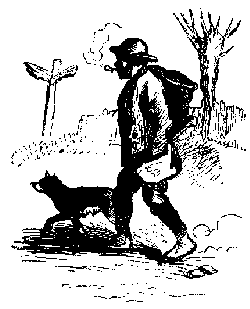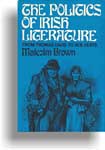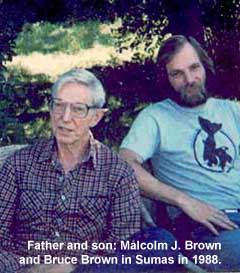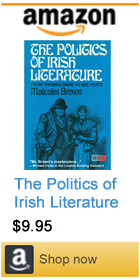Chapter One
History and Poetry: Some Irish Paradoxes
LET US MAKE a list of four names: G. B. Shaw, W. B. Yeats, James Joyce, and D. H. Lawrence. If we asserted that these were the most distinguished writers in the British Isles during the first half of the twentieth century, we would probably not provoke much argument. But what a queer list it is, for three of the four were born in Dublin. A solitary, provincial city, noted in the commercial almanac chiefly as a shipping port for cattle on the hoof -- why should it have been called upon to supply most of a great nation's prime literary talent? A tentative answer that insinuates itself into our thought is that culture must breed most where most is going on, where the most profound and excruciating issues drive toward resolution. For, if Dublin in the last hundred years was the least opulent city in the British Isles, it was at the same time the most exciting.
Out of what is civic excitement generated, if not out of history? From Norman times to the nineteenth century, the history of Dublin was mostly the history of the Anglo-Irish wars. Norman, Plantagenet, Brucite, Marian, Elizabethan, Jacobean, Cromwellian, Williamite, French Revolutionary, and Napoleonic -- all the wars were reducible to one simple, transparent motif: Irish misfortune under foreign conquest. After Waterloo the wars recessed while Britain became the workshop of the world; and amid the celebrated advance of Victorian times, Ireland was the retarded child. There used to be a commonplace saying that Warsaw's slums were the foulest in all Europe; but an Irish poet demonstrated statistically that by comparison with tsarist Poland, Victorian Ireland had got much the worst of it. Out of the mountain of sociological data that describes the unhappy condition of Ireland, a single bit can serve for a summary, if the neo-Malthusians will allow it: in the eighty years between Young Ireland (1842) and the Treaty (1922) -- roughly in the life span of Yeats's father -- the population of England and Wales multiplied two and one-half times, but the population of Ireland shrank to one-half its original size.
Through the centuries of dominion, English statesmen found little occasion to exhibit toward Ireland the spirit of reciprocity that had successfully cemented their union with Scotland. Irishmen they regarded as just another of the lesser breeds, a prostrate enemy always behind in the indemnity payments. They adventured into Ireland, one historian has said, "as men visit a wreck on a neighbouring coast." Gladstone freely confessed that the English record in Ireland was the darkest stain upon the history of a splendid people. His testimony is informed, and we must underscore it. It is the pons asinorum leading into every phase of Irish cultural insight, and woe to the inquirer who cannot cross it, whether from sentimentality toward the ancien regime or from an obsession for irony, a "Paradox Lust" in Joycese. Cecil Woodham-Smith has noted that the study of Irish history requires a temporary conversion of the greatest English heroes into villains, and that Elizabeth I, Cromwell, William III, and (one might add) the younger Pitt and Lord John Russell will appear in Irish history in a special characterization quite distinct from their English or perhaps even their absolute stature. This conversion is not just optional, it is essential.
Indignity, chronic wretchedness, and occasional episodes of the most acute agony made up the permanent norm of Irish life. The corollary was perpetual Irish disaffection, alternately flaring defiantly or sputtering in impotence, but never quite dying away. One hundred years ago Ireland was a minor agrarian nation, poor and defenseless, while England was the most formidable power the world had ever known. There were Irishmen who refused to be overawed. They fell into the habit of defying English authority whenever they believed themselves able. When not, they cried shame in a loud voice upon the political Union binding them to Great Britain and employed the deadly Irish asperity in desecrating the imperial ideal which trueborn Englishmen understood to be ordained of God. One hundred years ago this dispute showed no sign of resolution or self-exhaustion, and it was ordinarily classified as "insoluble."
All English statesmen since the Wars of the Roses understood that the Irish tie was not secure. As realists they recognized the weight of Irish hatred and the probable embarrassments of statecraft that the amputation of Ireland would impose upon a dismembered kingdom. They knew the danger of adverse precedent and looked for guidance in the truism that so long as any first defection from the empire could be prevented, additional ones could by definition never occur. These truths they both "knew" and "embodied," to use the Yeatsian discrimination. They never questioned the wisdom of their fixed policy of crushing at convenience all Irish national ambitions, and neither moral argument nor physical threat altered their resolve in the slightest. "The Repeal of the Union we regard as fatal to the Empire," Lord Macaulay proclaimed in Parliament, "and we will never consent to it -- never . . . never . . . never . . . never till the four quarters of the world had been convulsed by the last struggle of the great English people for their place among the nations." In defiance of Macaulay's resolve, the Irish nationalists could bring no arms or likelihood of arms. Yet they posted up the reply: "If Irishmen are ever to enjoy the rights of human beings, the British Empire must perish..."
|
|
Table of Contents
|

|
Astonisher.com is pleased to offer these excerpts from The Politics of Irish Literature by Malcolm Brown...
Praise for
The Politics of Irish Literature |
 |
|
"This brilliant study of the intersection of politics and literature in Ireland amounts to a dazzling portrait gallery. Reading it one feels about one the breath, warmth, and passions of the dead all come alive again."
-- Sean O'Faolain in the Manchester Guardian
"Mr. Brown's masterpiece has made me want to hire a nearby housetop and recite whole chunks to every passerby..."
-- Michael Foote in the London Evening Standard
"The author of the best book on George Moore now gives us what is in all likelihood the best book on the politics of modern Irish literature."
-- Virginia Quarterly Review
|
|

University of Washington Professor Malcolm J. Brown (1910 - 1992) with his son, Bruce Brown, in Sumas, WA, July 1988.
|
Additional reading -- Malcolm Brown's George Moore: A Reconsideration. Also see Bruce Brown's commentary on The History of the Corporation for Malcolm Brown's contribution to that work.
|
|
|






